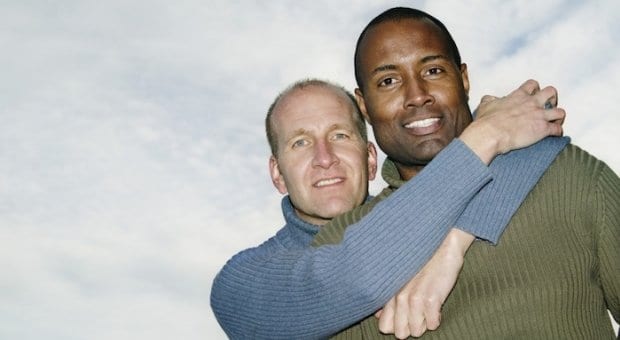Not everyone likes holding hands in public, but for some queer couples, PDAs can be fraught with anxiety and even violence.
Winnipeg native Karen L Blair, a queer researcher and post-doctoral fellow at the University of Utah in Salt Lake City, has embarked on a two-year study to research the physiological reactions of couples displaying affection while feeling stigmatized. Her team will also study the physiology of people witnessing same-sex couples showing affection in public.
“Since we’ve been sharing information about this study online in an attempt to get it crowdfunded through microryza.com, we’ve received quite a bit of negative attention and messages,” Blair wrote in a Sept 12 email to Xtra. “Just this morning I received a message that said the person hoped the entire KLB Research team would get terminal illnesses. It’s been disturbing to wake up to hate mail each morning, but at the same time, it has really made clear the importance of the research and the rampant homonegativity and hate that still exist.”
Blair talks further about her research in this edited interview, conducted over the phone with Xtra.
Xtra: What first drew your interest in the physiological reactions of couples displaying affection while feeling stigmatized?
Karen L Blair: I have two studies. One is looking at the physiology within the same-sex couples, and one is looking at the physiology of people witnessing the public displays of affection between same-sex couples. I study same-sex relationships as my main area of research, and I also study the health implications of relationships. If something stresses you out or scares you, your first instinct is to grab the hand of your partner, so in same-sex couples it’s an interesting phenomenon, where your instinct to hold hands could put you in danger and cause further stress.
Why is displaying affection in public problematic for some same-sex couples?
Is it an irrational fear that by holding hands you could put yourself in danger, or is that a very rational and well-grounded fear? By examining the actual physiological responses of the people witnessing same-sex PDAs, I’m hoping that we’ll be able to determine if it’s rational or irrational. I’m, unfortunately, leaning on the side that it’s probably going to be a rational fear. There have been quite a few examples lately of couples holding hands and being attacked for it, especially in New York City, in many of the most gay-friendly areas of the city. Men who’ve been holding hands together have been viciously attacked and beaten.
If people aren’t actually judging you but you feel like they are, is it physiologically the same experience?
That’s one of the things we’d like to find out. We’re going to study couples across the spectrum — from people who hold hands with their partners and don’t pay attention to other people around them, to people who never hold hands because they’re too afraid or just don’t like to do it.
Can this be a sticking point in a relationship — if one person refuses to curb their affectionate nature to appease homophobes, but their partner just doesn’t like PDAs?
That’s a sticking point in any relationship, regardless of the type of the relationship it is. There is this other element of just variability in individuals’ preferences for public displays of affection. For some people, holding hands is just too much. For other people, full-on French kissing is just fine. There’s a tolerance there of what you’re comfortable with that really has nothing to do with stigma or potential danger — it’s just a personal preference. When couples don’t match on that, it can definitely be a sticking point. But for same-sex couples it can be even more of a sticking point because they might have that additional reason for why they might be concerned.
How do you feel about the fact that in 2013 some same-sex and interracial couples still feel unsafe holding hands in public?
I feel horrible about that. I think especially in Canada, because that’s where I’m from, we’re kind of at a point where we expect that not to be the case anymore. Canada has done very well in terms of LGBT rights comparatively to other countries. We have a certain expectation of safety and acceptance, but that’s not the reality around much of the world, and even at home we find out that that’s not always the reality either.
Your funding is from the Canadian Institutes of Health Research (CIHR)?
I’m a post-doctoral fellow for CIHR, so they provide the funding that pays for my salary, and they provide a small stipend to go toward research costs. What we’re trying to do is get the rest of the funding in place for the study of the physiology of prejudice.
To watch a video about the study and see information about its crowdfunding, go to endhatecrime.com.


 Why you can trust Xtra
Why you can trust Xtra


